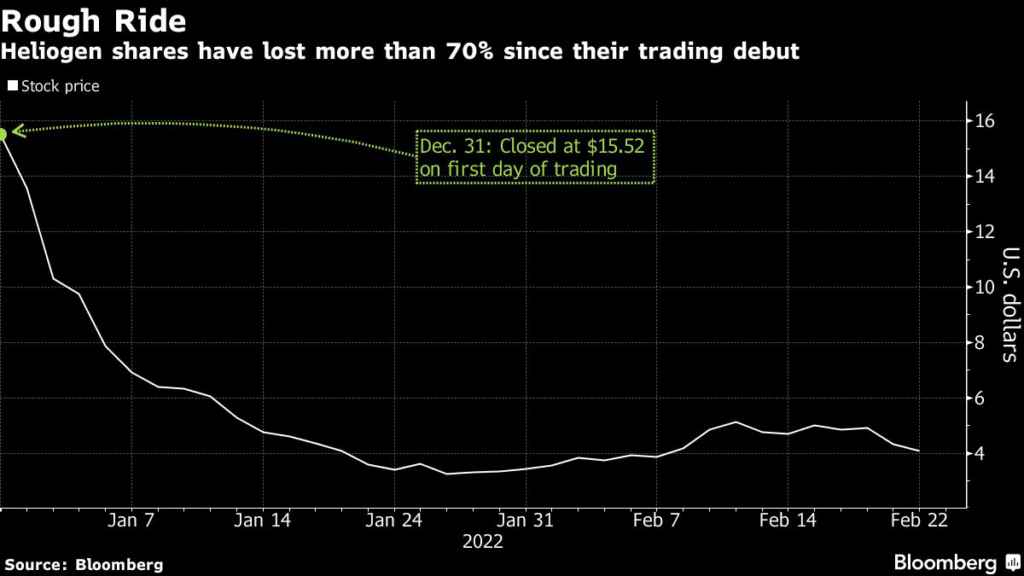(Bloomberg) — A solar-power startup little known outside of the energy industry gave its chief executive officer a bigger pay package last year than banking giant Goldman Sachs Group Inc. lavished on its own leader. It’s also in excess of what Chevron Corp. and NextEra Energy Inc. are paying their top executives this year.
Heliogen Inc., based in Pasadena, California, provided chief executive officer Bill T. Gross with compensation worth $37 million for 2021, according to a filing last month after it went public in late December.
Gross’s award, however, comes with a catch: It almost entirely consists of options that vest over four years and will be valueless unless he helps lift the company’s stock price back above $9. The shares closed at $4.07 on Tuesday.
“Those options aren’t worth a penny if the stock doesn’t go up,” said Steven Hall of executive compensation consulting firm Steven Hall & Partners.
Heliogen and its investors are betting on a high-risk, high-reward corner of the energy market. The company uses artificial intelligence to constantly adjust mirrors that focus sunlight on a small spot, generating heat that according to Heliogen can top 1,000 degrees Celsius (1,832 degrees Fahrenheit). It may be a way to cut fossil-fuel use — and carbon emissions — in heavy industries that require extreme heat, such as making steel and cement. The process could also be used to generate power or create low-cost hydrogen fuel.
Gross — not to be confused with the bond investor Bill H. Gross — has a long record as an entrepreneur, with both successes and failures to his name. In 1996, he founded tech incubator Idealab, which birthed many early e-commerce companies such as EToys Inc. and CarsDirect.com. Now he’s more focused on climate and energy, although Idealab is still going. Heliogen sprang from it, as did another company he helped found, Energy Vault Holdings Inc., which uses gravity to store large amounts of power.
Heliogen attracted big-name backers, such as Bill Gates, before going public via a special purpose acquisition company. But earlier generations of such “concentrated solar” plants — ones that focused on generating electricity rather than heat — underwhelmed markets. They proved more expensive and difficult to build than photovoltaic solar plants, which use the same kinds of solar panels found on home rooftops.
Heliogen shares have tumbled by 74% since its trading debut on the final day of December amid a broader selloff in SPACs. The company’s current market capitalization is just $746 million through Tuesday.
By comparison, Goldman Sachs has a market cap of $120.3 billion, and NextEra, the largest U.S. renewable energy company, is valued at $144.8 billion.
While Heliogen’s board may have provided Gross with a sizable pay package in 2021, it has no plans to give him future equity grants, a company spokesperson said. “We are proud that Mr. Gross’s four-year equity compensation package is aligned with our shareholders’ interests.”
Since the dollar value of Gross’s stock options depends on Heliogen’s share price, they wouldn’t have any current value even if he could exercise them. That, in theory, incentivizes him to stay on as CEO and chart a successful path.
Including his 2021 compensation and previous awards, Gross owns Heliogen shares and options that would be worth more than $115 million if all his time-based holdings vest and the stock rises back to roughly where it opened at $10, according to Bloomberg calculations. Most of that is from stock options Heliogen granted Gross prior to the 2021 award.
Comparisons of Heliogen’s CEO pay with its energy sector peers Chevron and NextEra are based on Bloomberg calculations of the two firms’ disclosed pay components for 2022, as they have not yet released their 2021 compensation.
Unlike in technology or finance, the energy industry isn’t known for awarding leaders lavish pay. None of the 100 top-paid executives in the U.S. are currently from the sector, according to Bloomberg data. That’s despite the fact that energy companies have been among the best-performing stocks in the S&P 500 Index this year.
But the tide may be changing. Some alternative-energy companies have begun dangling huge potential payouts in front of their CEOs as an incentive to expand quickly and grab market share as the industry takes momentum from fossil fuels. Among recent standouts is the solid-state battery startup QuantumScape Corp., which in December awarded its CEO Jagdeep Singh stock options that could potentially be worth as much as $2.3 billion.
More stories like this are available on bloomberg.com
©2022 Bloomberg L.P.











